| Srl | Item |
| 1 |
ID:
107941
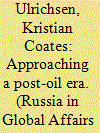

|
|
|
| 2 |
ID:
112960
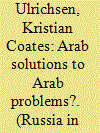

|
|
|
|
|
| Publication |
2012.
|
| Summary/Abstract |
By virtue of its very small local population and its extremely high level of oil and gas resources, Qatar simply does not face the socio-economic or political pressures coursing through the region. Uniquely, it has embraced the Arab uprisings as an opportunity, rather than a challenge, to cement its international (Western) reputation, albeit at the expense of some of its regional relationships.
|
|
|
|
|
|
|
|
|
|
|
|
|
|
|
|
| 3 |
ID:
183244
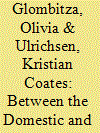

|
|
|
|
|
| Summary/Abstract |
This Special Issue examines post-2011 dynamics and the plethora of changes in the regional and domestic order in the Middle East and the Persian Gulf. It argues that ideational factors are instrumental in both the building of peace and the construction of threats. Consequently, ideational factors are constitutive in inciting or pacifying cases of tension and conflict. Departing from the inherent connection between the domestic and the international, the Special Issue analyses the reconfiguration of the region through the lens of possibilities rather than impediments and centres on the role of ideational factors in foreign policy and their impact on peacebuilding in the region.
|
|
|
|
|
|
|
|
|
|
|
|
|
|
|
|
| 4 |
ID:
079234
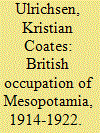

|
|
|
|
|
| Publication |
2007.
|
| Summary/Abstract |
During World War I the military campaign in Mesopotamia placed enormous demands on local man- and animal power to provide the logistical resources vital to its conduct. This required the British civil and military authorities to construct a wartime state apparatus that filled the administrative vacuum left by the retreating Ottomans and made possible its downward penetration and mobilisation of local resources for the war effort. This article examines the interaction of politics and logistics in Mesopotamia and views the enhanced wartime levels of resource extraction in light of the British attempts to codify their presence in the country after 1918 and the nationalist backlash that resulted.
|
|
|
|
|
|
|
|
|
|
|
|
|
|
|
|
| 5 |
ID:
127052
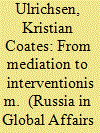

|
|
|
|
|
| Publication |
2013.
|
| Summary/Abstract |
During the first two years of the Arab Spring, Qatar's regional posture went into "overdrive," initially in Libya and subsequently in Syria. The country took advantage of the unique niche which it had spent years crafting in order to play an astoundingly high-profile and increasingly controversial role in the uprisings. Initially, it displayed unprecedented regional leadership bordering on outright activism in responding to crises across the Arab world. This greater self-confidence reflected multiple factors, including (relative) domestic stability and a progressive form of governance, as well as the ability to take and execute decisions quickly and the aforementioned experience in mediation. As a result, at the onset of the Arab Spring protests across the Middle East and North Africa, Qatar boasted a distinctive combination of characteristics rare in the Arab world, including regionally and internationally recognized legitimacy, a relatively progressive stance towards governance, an ability to make swift policy decisions, and extensive experience in mediation. All of these factors positioned Qatar to assume an extraordinarily visible and interventionist role during the Arab Spring upheaval.
|
|
|
|
|
|
|
|
|
|
|
|
|
|
|
|
| 6 |
ID:
105673
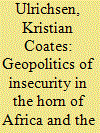

|
|
|
| 7 |
ID:
089126
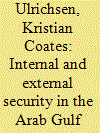

|
|
|
|
|
| Publication |
2009.
|
| Summary/Abstract |
This paper examines how the concept of "Gulf security" is evolving as internal political and socioeconomic changes in the Gulf states interact with the process of globalization and the impact of international events in this volatile region.
|
|
|
|
|
|
|
|
|
|
|
|
|
|
|
|
| 8 |
ID:
161999
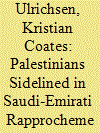

|
|
|
|
|
| Summary/Abstract |
This essay examines how and why Saudi Arabia and the United Arab Emirates (UAE) have pursued policies that have aligned closer to Israel since 2011. The disruptive impact of the Arab Spring and its turbulent aftermath altered threat perceptions in Riyadh and Abu Dhabi, which increasingly saw Islamism and Iran as the major sources of regional instability. For Saudi and Emirati leaders committed to adopting a more forceful approach to shaping the post-Arab Spring landscape, Israel no longer represented the primary fissure in Middle Eastern politics. Although the process of creating informal ties between the Gulf states and Israel has been decades in the making, the nature of the post-2011 connections between Saudi Arabia and the UAE with Israel have greater strategic depth and are taking place in a far more open setting than ever before.
|
|
|
|
|
|
|
|
|
|
|
|
|
|
|
|
| 9 |
ID:
153093
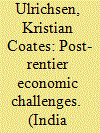

|
|
|
|
|
| Summary/Abstract |
The rentier states of the Middle East face a combination of political and economic challenges as they seek to reduce their reliance on volatile oil and gas revenues and diversify their economies. This article examines how the political economy of the six Gulf Cooperation Council (GCC) states remains heavily dependent on the hydrocarbon sector and analyses the policy responses to the fall in world oil prices since 2014. Sections in the article examine the definitional aspect of rentier state theory, nature of the redistributive welfare state that developed in the 1970s in each Gulf State, and the political aspect of economic measures that seek to reform aspects of the distinctive political economy that has underpinned socio-political and economic stability for the past five decades.
|
|
|
|
|
|
|
|
|
|
|
|
|
|
|
|
| 10 |
ID:
156487
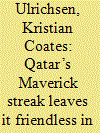

|
|
|
|
|
| Summary/Abstract |
“Years of anger at Doha’s brash regional policies may have made the opportunity to put Qatar back in its place too tempting to pass up.”
|
|
|
|
|
|
|
|
|
|
|
|
|
|
|
|